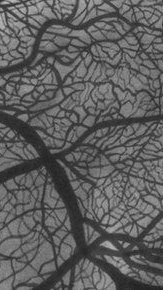

Olion watched his men writhe at the greening inside of them that was infecting, growing, lumping long-ways up from their wrists and on past their elbows. The newer recruits were still not used to the treatment, and were shaking their arms or sucking frantically at the wounds in the back of their hands, biting down hard to keep from screaming. This would only speed up the process, Olion knew. So he said nothing.
It was called Vimbremma, commonly known as blade-edging or simply “greening,” and was something the High Lords had invented in the Gardens of Myet’Na more than a century ago. They had perfected it over the decades, and by now not as many men died from it as had once been the case.
The plant fiber from the initial injection would continue charging up the canals between skin and muscle, breaking through knotted flesh like a vine, feeding on fat as it went. Once begun, its progress was inevitable. It would squirm into the soft armpit flesh and needle its way in every direction from there; deep into organs, brain, heart, through the groin and knees, straight through to the eyes and toes. The fibrous growth acted as an energy sink, reinforcing muscle and bone, and preventing fatigue by taking a beating in their stead. In effect, it made the men’s bodies faster and stronger, able to run long distances at speeds that rivaled that of a pa’mat, and which did not slow after sunset.
Vaardvir had administered it to them when they first set out from the city, three and a half days ago. It had sustained them until that afternoon, when their veins had gone black. Exhaustion followed, as always, so Olion had called for a halt so that they could be given a second dose. Treatment took about an hour.
He scanned the men with dispassionate eyes. They were well-trained; even the new ones knew better than to groan or whine at the bite of pain. The old plant fiber in their bodies would eventually dissolve and pass, staining their stools and urine black, as well as the veins in their arms and legs and even faces. Olion signaled to Vaardvir, who nodded and barked at the men.
It was time to go. The hunt was on.

Before I get started on this week’s topic, does anyone else think “Omicron” sounds like the name of some bad guy out of Transformers?? Just sayin’.
Anyway. Question: If your mind were an island, what would it be like?
Mine would have unfathomable tidal pools, all the most enticing shade of blue-green, with myriad googly things inhabiting them—some good to eat, others best to stay away from lest you yourself get eaten, but all mind-blowingly beautiful. There would be giant auks as big as rocs, diving one after the other from impossibly high cliff faces. The sun would sometimes take breaks, but it would always come out in time to thaw sore joints and melt ice fringes from streams trickling down through shady wooded valleys.
There would be caves on my island, too, with more winding passages and immensely vast caverns than could ever be explored in a single lifetime. The darkness emanating from those underground worlds would be the stuff of ghost stories and legend, but if you knew where to put your head, you could still find safe shelter even in the deepest depths and get a good, comfy night’s sleep.
Back on the surface of my mind-island, there would be broad-leafed bushes with giant, purple, unknown, insanely and addictively delicious fruits. There would be a high crag with a view across leagues of ocean on all sides, as well as a vale of trees from which sprouted random musical instruments—different types in every season, all ready for the plucking (or sawing, blowing, etc). Melody and rhythm would carry and echo eerily all ‘round the island due to its unique acoustics.
At night, you could see not just gazillions of stars in the sky, but faraway galaxies, too; the air would shimmer in just such a way that would amplify vision and render incredibly distant objects visible to the naked eye. Spaceships would careen past, on their way to and from places both magnificent and terrible; solar systems would spin into infinity, entire suns born only to die, over and over like rain droplets touching calm water.
There would be coconuts, too, but they’d be easy to get into! No need for a hatchet or to nearly break off the blade of your pocket knife trying to cut a hole, lol. And the liquid would be the purest ambrosia, from which fine coconut wine could be made. You would have the island all to yourself, but if you ever got lonely and wanted some drinking buddies, you could always just toss a rock over the (normally impossibly high) hill behind you, and by sunset all your favourite people would have arrived to help you build a fire on the beach, cook and eat a feast, and drink and be merry until sunrise touched the horizon with fingers of peach and mint and scarlet.
If my mind were an island, it would be sad sometimes. It would miss being able to do certain things; it would miss being able to spend time with certain people who can no longer stop in for a chat. The waves would crash against my mind-island over and over, and that would be sufficient distraction, most of the time… but occasionally, it would remember. It would remember. And remembering would be a mixture of joy and grief, like it always is. Like it will always be.
But the next day would be another day, the sun would rise, and I’d feel the tickle of sand between my toes once again. And sixty-five million billion trillion wonderful things would happen, and just as many beautiful sights I would behold, and peace and time would keep on keepin’ on.
So, what about yours? If your mind were an island, what would it be like?

Our neighbour Carole was kind enough to bring us several globe artichokes the other day, which she and her husband John had grown in their garden. They were such a lovely shade of purple! Here’s another photo she took of them, after harvesting:
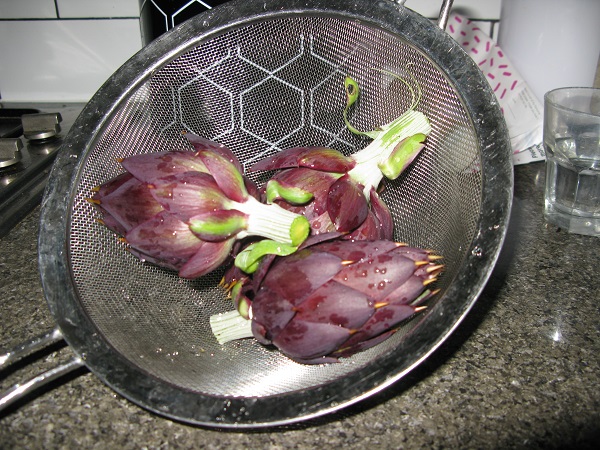
I grew up eating artichokes. My parents would always boil them whole in salt water and then serve them steaming on plates; each of us would get a whole one. We’d dip the leaves one at a time in melted butter, using our teeth to scrape off the soft edible parts and working inward from the outside leaves. When we got to the extremely tiny interior leaves and the choke, we’d use a dinner knife to cut those away from the heart… and then eat the heart. Yum! :-) There is no flavour like it in this world.
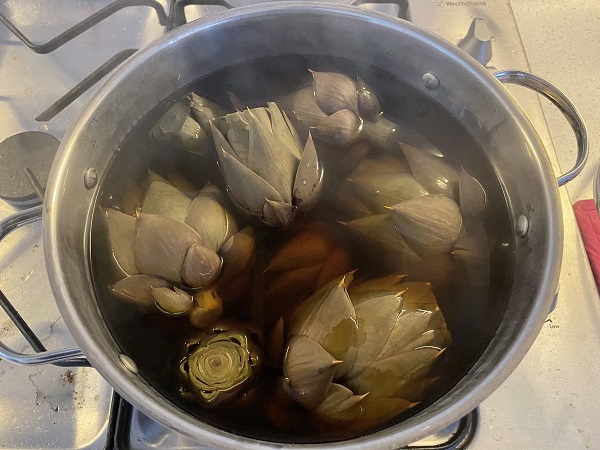
I had never eaten purple “globe” artichokes before, and most of the ones Carole brought us were rather small, but I thought hey, what the hell, and decided to give it a go. It was Saturday, so I had some free time. I began by chopping off the very thorny ends (ouch! pricked me thumb), and then plonked the artichokes into a big pot of salt water and boiled them for a good hour. ‘Probably was overkill, but they did turn out nice and soft.
So, as I mentioned earlier, when I was growing up and my parents cooked us artichokes, we would sit around the table and dip the bases of the leaves into melted butter and use our teeth to scrape off the soft edible parts. However, I had a different end goal in mind this Saturday: Pizza. And there were a lot of artichokes to prep. I therefore just skipped the whole butter-and-sitting-at-the-table part, and ate as much as I could as fast as I could of the flesh from the leaves, standing in the kitchen and burning my fingers on hot steaming just-boiled artichokes. I got faster as I went.



It was a lot of work for very little reward, in terms of quantity, but I got some good bites out of it. An extremely healthy lunch! As I got down toward the middle, the leaves got smaller and smaller and their bases more and more tender, to the point that I could simply pull them apart by hand. After the first couple of artichokes, I decided to start keeping not just the hearts, but these most tender leaf parts as well (er, petal parts – they are flowers, after all; ‘not sure why I have always called them leaves… they are petals, actually). I plopped everything that was soft enough to keep into the bowl…
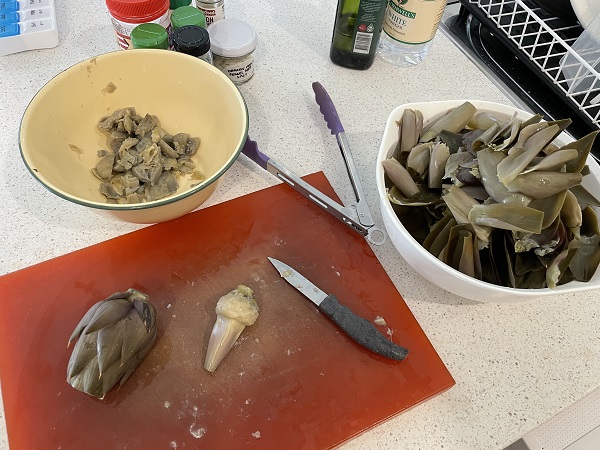

…except for the chokes. Once you’ve removed the petals, you get to a section of very fine, fibrous stuff (filaments, maybe? Any botanists / flower enthusiasts out there? Carole? Anyone? Beuller? Bueller? Anyone?). This part is often called the “choke”—which has always put the image in my head of some unlucky soul choking on one—and can very easily be cut away from the heart with a small knife. You have to be careful not to cut too deeply, though, or you’ll waste some of the yummy heart.
The stems of these small artichokes were too fibrous to eat, so I cut them away as well, leaving just the soft, edible heart. This I then cut into smaller sections, and added them to the bowl.
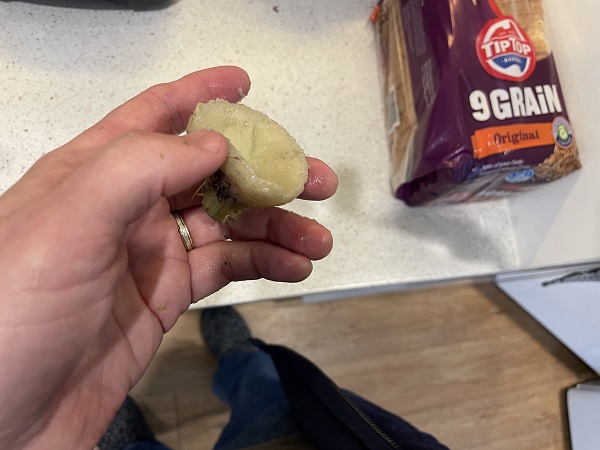
Okay, all done. Whew. There were ten or so artichokes; that took some time! But it was fun, and nice eating the flesh from all those petals as I went. Next step: Marinate.
Oh, wait. Oops. Mybad. Next step is to check with the sous chef and make sure everything is up to par.

Cool. She said everything is up to par… I think. Or up to purr. Or… I think she actually said something like, “quit yer messin and git me some food. Neow!!!”

To the bowl with the artichoke hearts and tender leaf parts I added sweet paprika, garlic powder, dry basil leaf, dry cilantro (coriander) leaf, onion powder, salt, olive oil, and a bit of vinegar. I didn’t measure anything, but I deliberately went light on the vinegar; more would also have been nice for certain things, such as salad perhaps, but for pizza, I didn’t want it to be too vinegary. Yes, that is a word, apparently. Wheeeee
Okay, step one finished. Step two: Make the pizza. Normally we do homemade pizza the easy way, using premade store-bought pizza bases. Lebanese bread (in America it’s usually called “pita”, only these ones here in Aus are larger and lighter / less dense) works well, too, though it isn’t as filling. Saturday, though, I decided on a whim to make the dough from scratch. One problem: We had no yeast. Okay. Hmm. Surely I could find a recipe for yeastless (another real word, I promise) pizza dough, I thought. And voila! I found one.
After rolling out the pizza dough, I discovered that the pizza sauce I’d thought was in the fridge had all been used up last time we made pizza. Bummer! So, I decided on a sauceless pizza (I was at this point feeling too lazy to make my own pizza sauce, and I’m not sure we had enough tomatoes anyway). I drizzled and spread olive oil around the base, including on the outer edge for browning, and then sprinkled on the cheese. This time I used a sharp tasty (cheddar).

Next went on the rest of the ingredients, in the following order: A bit of garlic powder, a bit of dry basil leaf (often I’ll use an “Italian” spice mix that includes oregano, but oh well), black olives (careful, the juice from these can be salty, so don’t overdo it), my homemade marinated artichoke hearts & parts, leftover baked chicken from the night before, mushroom, red onion, and a bit more cheese on top just to help hold it all together.

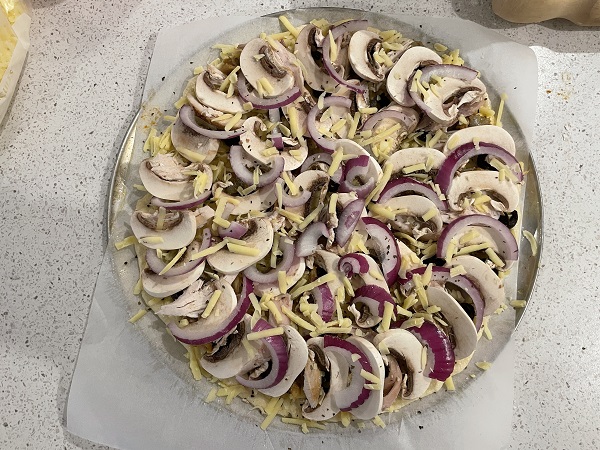
I’m not sure how long I baked it, as I didn’t time it, but once it started looking and smelling close, I pulled it out to cut it into slices and then stuck it back in. The reason for this is that a pizza with a lot of mushroom often gets pretty soggy from all the excess water, and baking it a couple more minutes with it separated into slices helps to dry the pizza out. With this particular pizza, in retrospect, that step probably wasn’t necessary, because despite the large amount of mushrooms, the lack of sauce made it a lot less moist anyway.


The result, I must say, was pretty tasty. If I had it to do over, I think it would have been nicer with a pizza sauce, either tomato or pesto (sorry, bbq lovers!), and moister, too, but it was not dry. The crust came out really well—it was crisp and not floppy at all. It didn’t have that traditional greasy pizza crust taste, and wasn’t as chewy as most pizza bases; it almost tasted more like a biscuit (as in, American biscuit). But it was really quite good. And I could definitely taste the artichokes! Not too much vinegar; just enough to lift it, and you could still taste the artichoke flavour. Quite a satisfying artichoke-and-pizza experience, really :-) Thank you Carole and John!!!
By the way, if you don’t like chicken, plain tuna works well with these other ingredients, too. My friend Nathan and I discovered that one time when we were making homemade pizzas at my apartment a couple of decades ago; we’d made one “normal” pizza, with more traditional ingredients and a tomato-based pizza sauce, but then we still had another pizza base leftover, so we decided to make a second pizza using whatever ingredients we had left. Well, there was no more sauce and no more meat and very little by way of veggies left, so we put on black olives, marinated artichoke hearts (store-bought), red onion, cheese, and tuna, with just some olive oil instead of sauce on the base. We thought these weird ingredients would make the pizza taste terrible, but we were pleasantly surprised to discover how delicious it was! The flavour of the tuna can be a bit overpowering, though, so you have to be careful not to put too much on.
Okay, if you decide to try making your own marinated artichoke hearts, I wish you luck :-) It’s a lot of work, but well worth it! Thanks for joining me.

Today I flipped open an old journal. It’s one I kept back in the summer of 1992, when I went traveling around Central America and southern Mexico for about a month. I was not quite nineteen at the time. Young and very dumb. It’s quite a trip down memory lane, reading this stuff. Seeing what you wrote nearly thirty years ago…. Anyway, I thought I’d share one of those old journal entries here.

June 2nd, 1992
‘Holy shit today was a long day! My whole body is sore and my head hurts. But my nose is being inundated with the o-so-yummy smell of wood smoke… the wind is keeping a nice pile of coals alive behind where I’m sitting. The stars are out in amazing quantities, and the moon is just a fingernail. My tent’s being whipped and rattled by the wave-driving air, but despite the violence and roar of it all, this is a place of peace. The coconut palm leaves sound like trickling water, the distant music and laughter rising and falling on the wind. Sand is getting everywhere, including in my eyes. But still no mosquitos, thankfully.
I like knocking on wood. Why do I do that? And why did I just look at my watch? Because it’s there, probably. I don’t usually wear one. But wowzers my feet hurt. And my [ok, yeah, I think I’ll omit this rather crude string of silly anatomically-based profanities, lol] itch.
Today was a day from hell. Well, it had ups & downs. So, purgatory I guess. Whatev, as Robert L. would say. I woke up to my alarm at 7:00, but I decided to sleep a little longer… until suddenly I heard horse hooves. I sat up, and a couple of men and their horse were standing over me. “Amigo, por favor….” That’s about all I understood of what they said, but I got the drift that I was not allowed to camp there. I was desperate last night, come on! [I’d taken the bus from the Cancun airport straight south along the coast, and had inadvertently overshot the beachside campground that had been my original goal; so, I had gotten off the bus in the middle of nowhere, walked over to the shoreline, and decided to just keep making my way south until I’d found a place to stay. By nightfall, there were still no signs of any campgrounds or anything; upon trudging a little further around a palm-crowded point, I’d come face to face with a giant, brightly-lit resort hotel. It was late and I was hungry, so I pitched a tent—not right on the hotel grounds, but apparently not far enough away.] Anyway, I told the men I would be gone in 30 minutes. Less than half an hour later I had my shit packed up just in time to keep it dry from a 2-minute downpour that came out of nowhere, and then just as fast the morning sun came back out and the sky turned mostly blue again. The ocean looked beautiful.
I had to hike way the fuck around a gigantic man-made lagoon, and when I got most of the way around, I hit a little road and turned left, thinking it would take me back east to the beach. It ended at a private hacienda with a big KEEP OUT sign. Well fuck me. I took my pack off and thought awhile. After a short pop-tart break, I decided fuck it and did a stupid thing. I tried to cut through around the house and through a garden to the beach, but the route led me into a thick-ass thicket of mangroves and some stagnant water, and it was there that I saw my first mosquito. I have been taking anti-malarial drugs, but still. It’s not the type of disease you want to catch if you can help it. And suddenly, all thoughts in my mind that I could bush-whack in this country were completely dashed.
Finally, though, arms and face scratched bloody, I blundered out of the woods and onto another private drive, and this led me to a gorgeous sandy bay—and I found myself back on track, headed south along the coast.
Hot and thirsty, I walked along the beach for a few miles. At one point I came across two dogs, which barked at me and followed aways until they lost interest. Then I rounded another bend and came upon a casa, and three men were sitting outside the door with a big pitcher of water with chunks of lemon in it on the steps between them. Totally parched, I decided to practice my Spanish. “Por favor, yo quiero agua.” And one of the men smiled and picked up the pitcher. He filled up my water bottle for me and I sat and chatted with them awhile, in caveman-speak on my part, because I barely knew any Spanish at all. But through a series of gestures and words, I managed to explain to them that I was walking along the coast to Akumal. They looked both amused and bemused. [And now, reading this, I’m guessing they were all thinking, “crazy dumb gringo”….] It turned out they were landscapers, there upkeeping some rich dude’s winter vacation villa.
Thanking them profusely for their kindness and generosity, I set off down the hot beach.
The coast is generally tough going. Sometimes there is a stretch of lovely, flat, compact sand, which makes hiking easy. You walk just above where the waves break, and it’s as solid as a dirt road. But often it’s gravel or boulders or coral boulders (the worst), or the beach is completely non-existent, as the plants come right down to the water. Or the sand is so loose your feet get exhausted. [This was decades before I’d met my wife, who taught me how to walk properly in sand.]
Sometime around midday I saw two soldiers with rifles who asked me where I was headed (in Spanish), and either didn’t know where Akumal was or didn’t understand what I was trying to explain. They followed me awhile, but at some point I turned around and they weren’t there anymore.
I eventually found a patch of shade beneath a gorgeous palm; I rested for an hour and ate some tuna and drank most of the rest of my water. Like a dumbass.
Sand got in my butt. The beach continued. Bay after bay after thirsty anguished picturesque lonely crab- & snail-strewn full-of-doubt pristine turquoise bay. There were 14 of them. The 13th was Yal-kul Lagoon, where I almost did a really stupid thing.
It was this deep-ass channel cutting through the rock, with the ocean on the left, and reaching inland where it widened into a lagoon surrounded by big mangroves. The vegetation came right into the water and looked way too dense to go through and around, and I could see there was a rope leading through the agua to the other side, swaying in the swell of the waves. The water was so clear I could see the bottom in detail, even though it was a good ten or twelve feet deep. Sand, rocks, fish. I was about to cross, but this sneaking feeling like I’d end up slipping and lose my pack or everything would at least get soaked made me put it down on the dry rocks and look around for a bit. I found a way around, through the rocks and mangroves. It took me more than forty-five minutes out of my way, and gave me a ton more scratches and cuts on my arms and legs, and I saw more mosquitos. But after I cut back to the ocean and rounded the point, I found paradise in the next bay: A beach, palm trees, and a grassy shady flat tent spot with good views on both sides (hills, ocean).
I really wanted to camp there, but I was out of water, so I decided to push on to Akumal, with the vague intent of returning to paradise someday. A mile or two later I did manage to climb far enough up a coconut tree to knock one off with a stick, and then spent the next twenty minutes trying to cut into it with my pocket knife. The reward was pure gold. Somehow the liquid was cold, and it was surprisingly clear in color (I always thought coconut milk was white, which it is but I guess only after it’s been in a can). It was absolutely delicious, and quenched my thirst and woke me up.
By late afternoon I was weary and didn’t give a shit anymore. I came to another inhabited area, and trudged through someone’s backyard; a woman turned off her Walkman and glared at me, and I said perdóneme and kept going.
I skirted around some hotels and another residential area. I wanted something to drink so bad, but there weren’t any shops or anything, and I figured if I went into one of the hotels I was bound to get kicked out, as ratty as I looked. They were posh resorts for posh people, it looked like. Might get arrested even, and I definitely didn’t want to take that chance. I stuck to a bush-lined road that seemed to be heading parallel to the beach.
I saw a scorpion and dodged it. Awhile later, I ran into a gardener with a straw hat and a sweat-stained T-shirt and a big moustache working next to the road, and he gave me directions to Akumal in Spanish. I thanked him and waved. Not long after, he came peddling up behind me on a three-wheeled bike with a cart, and told me to hop in. His name was Louis, and he peddled me the rest of the way to Akumal (I was nearly there, I just didn’t know it). He dropped me off and pointed out to me where to buy a coke. I bought him one too, as thanks, and guzzled mine down like it was the last thing on Earth. He laughed and waved goodbye, and I got another coke and a yummy chicken sandwich thingy.
The dude who served me from the food stall told me the next campground was still another 5km because the one in Akumal was closed. I put my pack on and started walking, then, because the sun was setting fast. His directions took me inland a little ways to the two-lane highway, so I decided to try thumbing it. A wonderful group of four picked me up in their rental and took me all the way to Tulum. One of the women spoke French and Deutsch and Spanish, and all of them spoke a bit of English. One couple were from Puerto Rico; the man had studied on Long Island and in New Jersey. They were on their way to Coba, they said. They dropped me off where I wanted them to, despite being genuinely concerned about my well-being, and I thanked them and waved goodbye as they drove off and I set off in the dark along a road toward la playa. Two vicious dogs barked and I froze, until a figure with a flaming torch said something in Spanish. The ruins were locked, so I headed farther south until I hit a path that led me to the beach. There were lights, and music, and the smell of food, woodsmoke, and a bunch of drunk surfers and hippies and travelers hanging out at a bar and on a big wooden deck, with several tents off to the side. I’d made it.
I’m sitting here with my flashlight writing this under the stars, next to my tent which I set up in case it rains. I can hear “Whole Lotta Love” playing. I’m still buzzing from the beers (Superior y Leon) I drank with a local guy named Ferdinando and a Belgian guy named fuck I don’t remember, but he made howler monkey sounds and talked about mosquitos at Palenque. I felt weird and out of place at first, but they were nice and made me feel gradually bolder and then at ease. Some rasta dude from London and Jamaica showed me this beautiful place in the sand and said “Camp here mon.” I am surrounded by a mix of sounds… music, Spanish, American, waves, palm leaves, dogs, laughter, wind…. I feel happy. Tomorrow I get up for sunrise and a swim. If my body still works that is.
Damn. I hope that ice I had with those cokes today doesn’t give me the runs.’

Unless it’s absolutely bucketing down rain outside, I tend to go for a walk around the neighbourhood a couple of times a day. It feels good to get away from the computer screen; the exercise and fresh air and change of scenery help me clear my head / reset my brain.

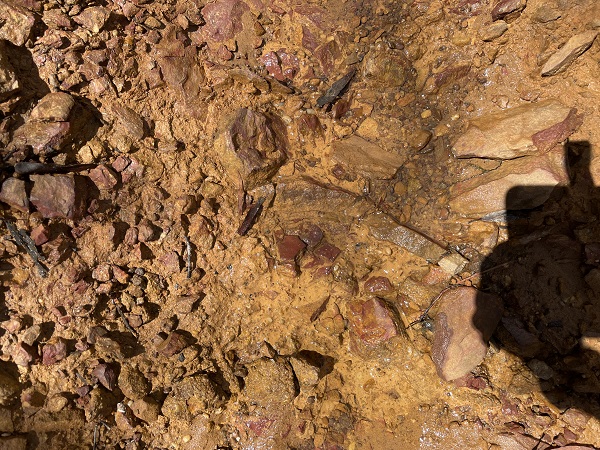
My usual route takes me along a dirt (very pretty dirt) track through the bush, up along the ridge that’s near our abode. It’s mostly council-owned land, which at some point will likely be sold for profit to people looking to move up from Sydney and build houses where it’s cheaper (because with the median price of a house in Sydney currently at AUD$1.499 million, everything up here is a LOT cheaper, and with the pandemic, more and more people have realized they can work from home and don’t have to pay sky-high urban prices; they can just move "into the sticks". This trend is of course driving prices up in our area).
It’ll be sad when this area gets developed. For now, though, it’s like we have our own little park to walk around, and it feels quite wild.

There are loads of pretty wildflowers.
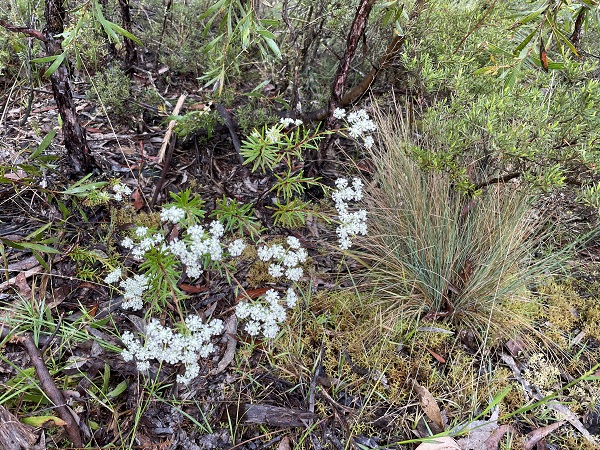
And rocks. This one probably leftover from when they dug the train track, I’m guessing:


And trees. It’s been about nine years since the bushfire that burned those trunks (above), or so an elderly neighbour told me.
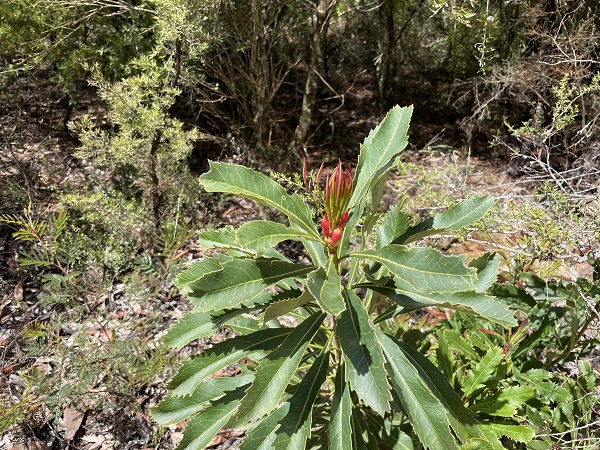
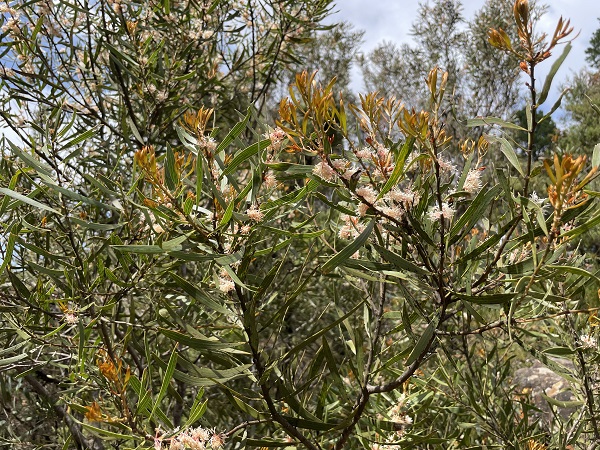
Along this stretch of road, my wife and I saw a big fat bluetongue lizard one day.
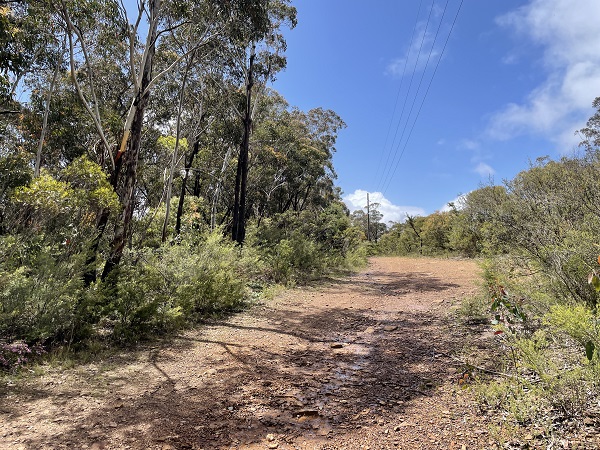
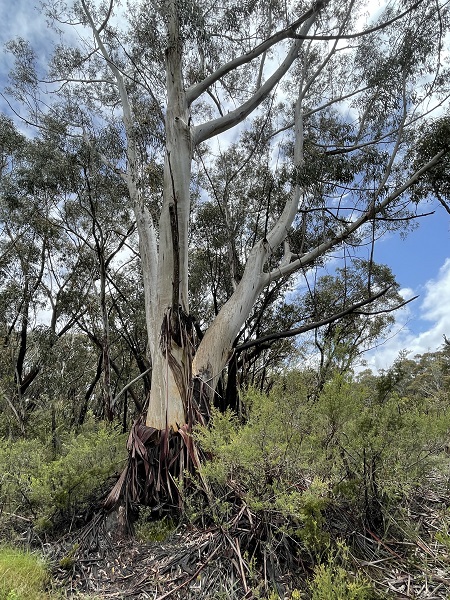
I love this old tree.
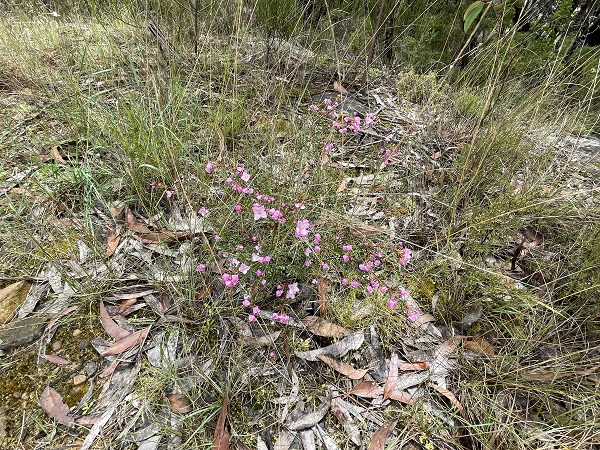
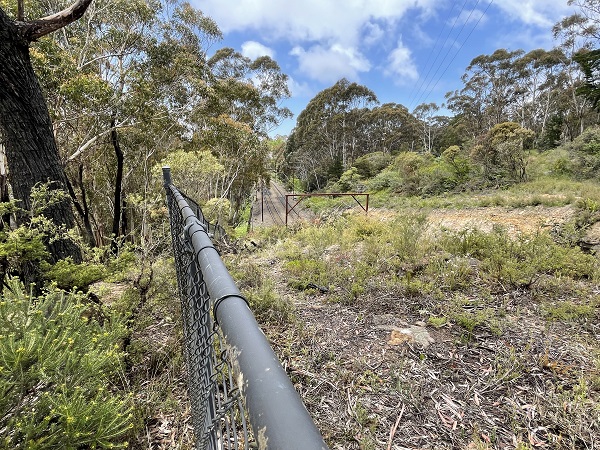

One thing about the native wildflowers is that so many of them are tiny or subtle in colour. You have to get up close to really appreciate their beauty. Sorry; these photos don’t do them justice.

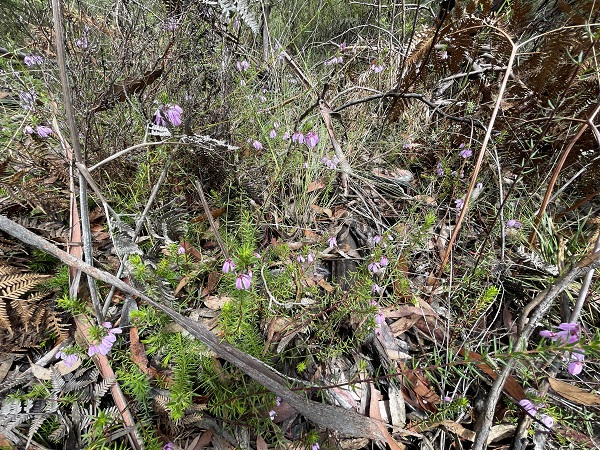


Along this stretch of track, a ways down on the right, is a house with the largest, most magnificent rooster I’ve ever seen. If I walk past while he’s around , he’ll often charge the fence at me or hop onto a low branch in a tree that's on the other side of it and crow his lungs out. Like a gorilla beating its chest I guess.
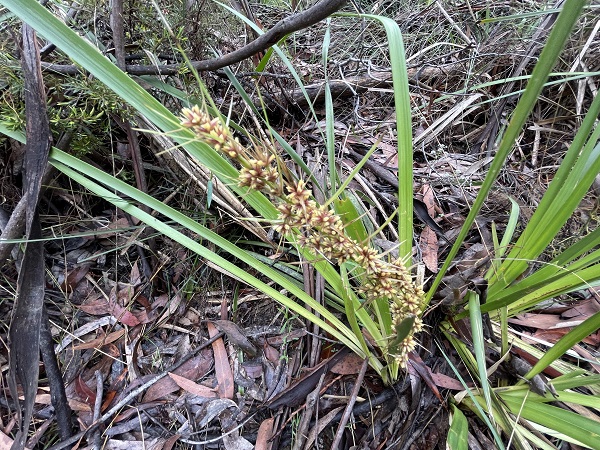
So many pretty flowers around. I love springtime.

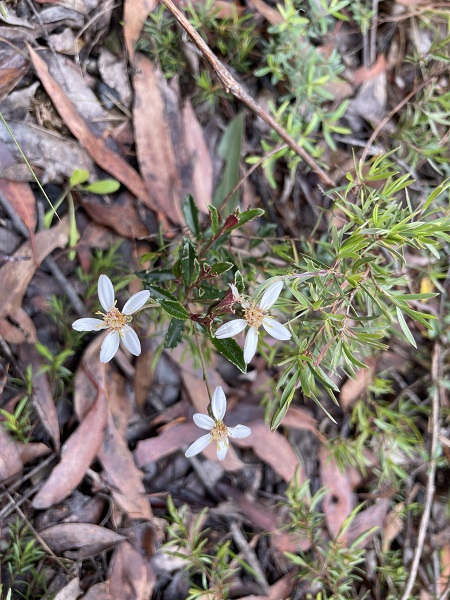

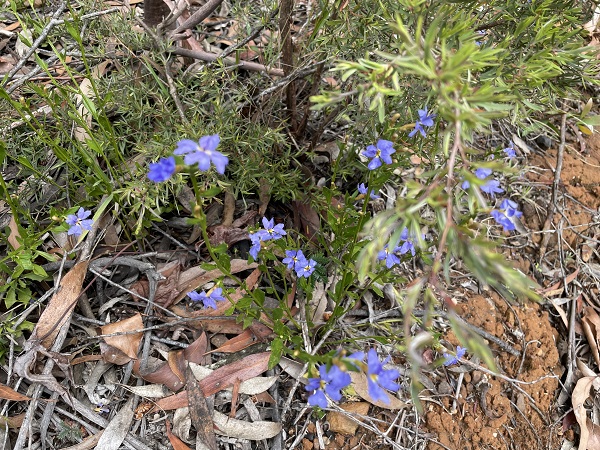
This one’s called gravillia I believe, or something like that:

Okay. Thank you for going on a walk with me :-)

Some years ago, I got it in my head that I was going to make maple syrup. I’m not sure what the inspiration was, but all of a sudden I was looking up instructions on how to do it. I remember being surprised to discover that it is a fairly simple process.
First, I needed trees. Well, I was living at my parents’ house at the time, in middle Tennessee, and the woods there are full of a gazillion sugar maples. Check. Next, I needed a way to collect the tree sap. I salvaged a few aluminum (a.k.a. aluminium, heh) cooking pots from the camping closet, all with handles; then I found an old bamboo whistle I’d tried to make a long time ago but which didn’t make a good sound anyway, sawed a notch near one end wide enough for a pot handle, and did the same to two plastic see-through shafts from ballpoint pens I’d taken apart; and lastly, I secured the handles to these improvised tubes using duct tape (which at the time I still thought was spelled duck tape, quack). Check.
Next, I headed up to the top of our little dead-end street to a section of woods there, chose three healthy-looking trees, and used my dad’s old brace n’ bit drill to drill up into the trunks at a forty-five degree angle—just deep enough to tap the sap, but not deep enough to hurt the trees. I’d chosen this location because it faced south, and would get a good amount of sun. This was in late January; I’d read I had to tap the maples late enough in winter that the sap would flow, but not so late that it had started to go starchy in preparation for the production of new leaves. Check.
It was a lot of work, but fun. The most challenging part was to get my improvised taps to stick tightly in the holes so that the sap ran through them rather than around them; more duck tape helped with that. And then, lo and behold, as the sun rose and the trees warmed up, the sap started drip drip dripping until it was a full-on flowing dribble from all three taps.
The sap flowed in a daily cycle. I was excited, and kept checking the trees at different times of day. In the early morning, there was no flow at all; not even a slow drip. By mid-morning, the taps were dripping, and the frequency of drips (FoD, yes I made that up) gradually sped up to a rapid dribble by mid-afternoon as the trees warmed up. Then it slowed gradually back to a stop by late evening. I can’t remember how long it took to get enough sap to fill the huge pot I had for boiling; not too long I don’t think. Anyway.
I drank some of the sap straight from the tree. It was clear as water, with only the subtlest of sweet taste. Wonderfully cold and refreshing, like water from a spring or an alpine stream.
The only ingredient you add to make maple syrup is heat. Well, there was a stove in the kitchen with working burners: Check. And for several days, much to my parents’ headache, no doubt, I had that pot boiling pretty much constantly, from early morning to late evening, and I’d refill it now and then, too. Roughly speaking, the ratios of sap to syrup I’d read about were 40:1 (for thicker syrup) or 30:1 (for not quite as thick syrup), but that is a LOT of sap.
Bit by bit, the excess moisture steamed away. The first stuff I bottled was very thin, very liquidy (yes that’s a word, I have just decided). It tasted nice and sweet, but was probably a lot runnier than most people would like on their pancakes. The next batches I boiled off longer—probably to at least a 30:1 ratio, though I wasn’t trying to be accurate in my measurements—and it was a bit sweeter and a tad more viscous. Still not as thick as commercial maple syrup, the darkest of which is often closer to a 60:1 ratio or even thicker, but it was good enough for me. In fact, I preferred it the way I’d made it; dark / thick maple syrup can taste too sweet, in my opinion.
All in all, it was a very rewarding experience. The syrup was yummy, and I gave most of it away to family and friends.
Someday I’d like to do it again, but somehow I don’t think I’d get the same results from eucalypts. Just sayin.

These days getting your head “cleared” involved a hell of a lot more than the gold old-fashioned reboot-n-go that had been the intersystem travel standard for more than half a suntury. Everything was still fully automated, of course; even more so, in fact. Now all you had to do was accept initialization and sit there, wherever you happened to be, and Govcorp’s remote scanners would do all the work. The service package even came with a complementary temporalization, during which you were welcome to drift off to the La La Land of your choosing until your fresh-start brain was ready to launch into the next stop on your itinerary.
That was all well and good for the average Joe-blow transworker, tourist, or traveling contractor; however, if you had something to hide, you were kinda screwed. This was because whenever anyone wanted to travel between stars, he, she, or it had to submit to this spanking new service before a reboot and relocalization to the new body was possible—and that’s where things got complicated, because during the prescanning process, nothing in your head was private. Every thought, memory, and twinkling of emotion was meticulously translated, recorded, and automatically cross-analyzed in multiple scenariosits by the Wandernet’s ogglers. And all of them, as everyone knew, sat firmly in Govcorp’s pocket.
There was a way around it, though. You couldn’t just hijack a scannernode, of course; besides the problem of the quadruple redundancy, the machinery would simply shut itself down before you’d even hacked through the first layer of security progs. But what you could do was to locate all the nodes that were remote-linked to the transporter you planned on using. And once you’d done this, you could blow them the hell up.
Zeb set the final charge and reactivated his personal refraction field. He then casually slipped past the dozing guards, down the stairs, and out the front door. The chronometer in the bottom right corner of his in-eye displaymod told him he had nine minutes before the next syslock scramble. Plenty of time to reach the transporter two blocks over.
When he got there, the queue was only a few people deep. They all looked half asleep; 3:45 a.m. was an early start no matter what you did for a living. Still shrouded from view by the refraction field, Zeb maneuvered his way to the front of the queue without issue, causing only a moment’s confusion in the woman whose turn it should have been when the plate sensor beeped at her to step back behind the yellow line. It was the kind of sensor that cared how much you weighed, not what you looked like or how invisible to the human eye you might be.
The light went green, and Zeb stepped into the booth. As the door was sliding shut behind him, he quickly initiated the destruct sequence with a series of twitches in his extraocular muscles. Five seconds, to allow for lag.
The door was centimeters from being closed.
…Four.
Three…
As the door sealed shut, the service bot clamped its arms around Zeb’s body in preparation to move it for long-term storage. He wasn’t planning on coming back, at least not for a very long time, but keeping a body on ice here could prove useful at some point in the future. After blinking in a submission of his itinerary, he closed his eyes and waited.
...Two.
…One.
Two blocks away, and simultaneously at three other locations around the CBD, tiny explosions ripped through the four scannernodes remote-linked to the transporter. Unable to initialize a scan or the allotted complementary temporalization, the transporter defaulted to the next step in its command process.
Milliseconds later, Zeb felt the falling sensation that came with a complete reboot, and his mind went blank for a subjective moment as it was translated through the quantum relocation prog.
He opened his new eyes in a body that had been born and nurtured a hundred and forty light years from Earth. As the service bot ushered him through the various adjustment and coordination processes, Zeb took a few moments to glance over his new body. Male again, which he preferred; in its late twenties, apparently healthy, and even endowed with a fairly muscular frame. Not bad, for a rental.
As soon as he was able to walk, he set out to explore his new home. There was no telling when his handler might next contact him, so he might as well grab some R&R while he could.
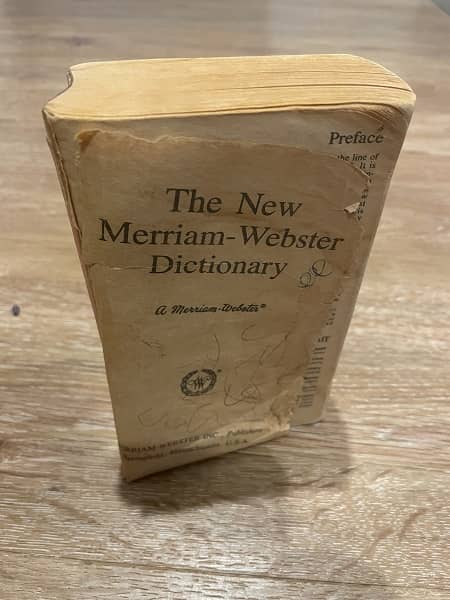
Confucius said, “三十而立”, meaning, “by the age of thirty, a person (he meant “man” but I’ll say “person”) should be ‘standing’,” with ‘standing’ having connotations of being upright, established, mature, independently and securely standing on one’s own two feet, and so on.
Well, at forty-eight years old, I’m only now finally beginning to establish a discipline in my life, a career; a path forward that I hope to travel into my old age. So, it seems I’m about eighteen years too late. I’ll admit that I sometimes look back on my life and wonder what in the hell I’ve actually accomplished.
One thing I have managed to do is wear out a bunch of dictionaries over the years. I’ve always been fascinated with language and words; when I was a kid, a friend and I even made up our own alphabet. I took a few French lessons early on, but it didn’t click with my brain for some reason. Starting in seventh grade, I learned German for six years, and got advanced enough in it that my high school could no longer offer any courses for me, so I was given permission to take a city bus twice a week to Vanderbilt University, where I took an intermediate-level college German class throughout my senior year. Sadly, a good 95% of my German has flown right out of my head, but I was at least able to do some mild damage to a couple of German/English dictionaries. Here’s one of them:

While applying for colleges, my original plan had been to follow in my big brother’s footsteps by studying cultural anthropology. Unfortunately (or perhaps fortunately, in retrospect), between the time of my acceptance to Oberlin College and my enrollment there, two of the anthropology professors—the backbone of the department—left, so I decided instead to study a language.

I wanted to learn something completely different from anything I’d ever been exposed. The choices were Russian, Japanese, and Chinese, and despite year after year of “world history” taught in social studies and history classes in school, I knew virtually nothing about any of those three places. I was told the Russian department wasn’t all that strong, and compared to Japan, China was bigger on a map, so I decided on Chinese. And thus began an exploration that continues to this day.
I threw myself into it. Passionately. I spent a year in southwest China, studying and later travelling around, and I had two dictionaries that were my constant companions—one a little red travel dictionary, which, after many years of use, literally fell apart at the seams. I wish I had a photo of it; back in 2019 I came across it while visiting my parents’ house, and regretfully said my goodbyes and threw it away. That little book had seen a lot of miles, a lot of hours of my fingers and thumbs leafing through it, looking up word after word after word. *Sigh*... so many memories. Here is the other dictionary I had with me while in mainland China. I still use it now and then for certain things:
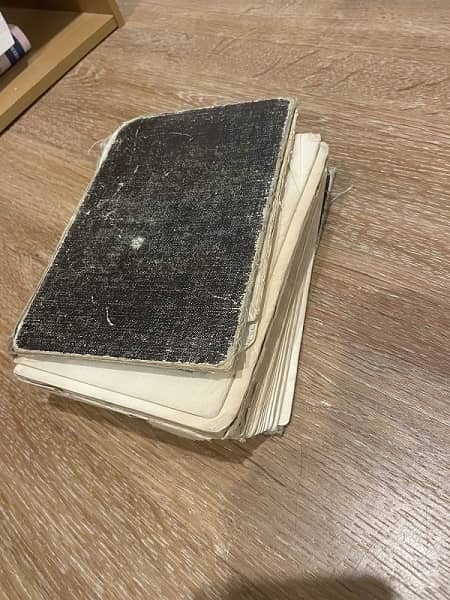

I used to work in bookstores. I love the smell of old books, and dictionaries are the same. I actually like to stick my nose in them and take a whiff now and then.

I’ve been accused of having a problem; I keep collecting dictionaries! I can’t help it. I see one and want it on my shelves. As though the simple act of owning a dictionary could somehow imbue my brain with its wealth of words.
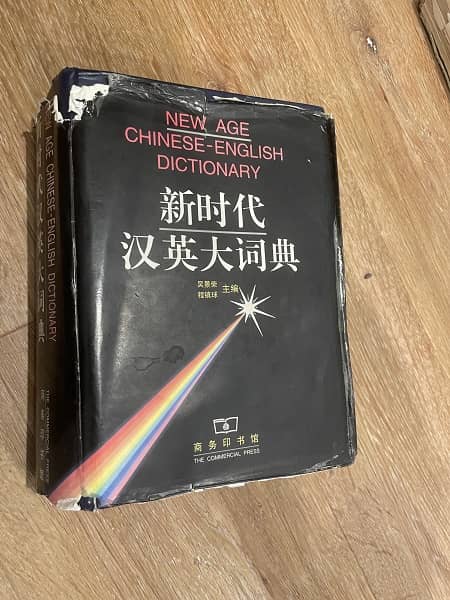
My travels and studies took me to other places, too... Taiwan, North Carolina, South Korea, Europe, Central America and Mexico, Australia. I’m only showing photos of some of the ones I use or have used; there are several others on my bookshelves (English ones, English/Spanish and Spanish/English ones, Korean/English, an Italian/English one which I have not used much at all(yet!), even a "How to Speak Southern"—but then that's a whole nuther story.
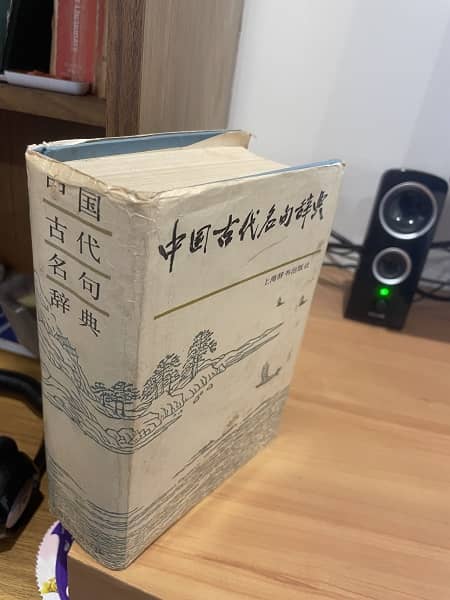
Anyway. Enough rambling about dictionaries. They are books of power, but you’ll just have to spend some time with one, or several, and discover that for yourself. My next project is to learn English, and here’s one of the ones I’m using for that:
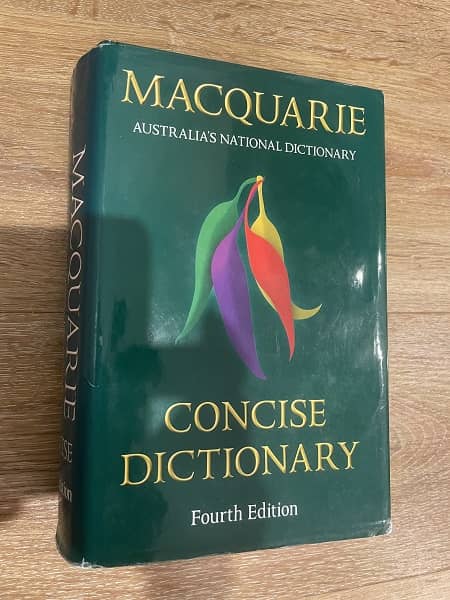
Today I finished reading Beloved, a novel by Toni Morrison. I’m feeling rather speechless, but I also have an urge to say something. I’m just not sure what. So full of competing emotions right now.
Part of me wants to just shut up and say, “You have to read this book. Everyone has to; especially Americans, but not just Americans. That’s all I have to say.” And perhaps I should.
A friend on social media the other day posted a link to someone’s tweet, though I do not know what the original source of the quote was; sorry -- anyway, it said, “One of the problems is that slavery is taught as the history of Black people and not the history of white people.”
Absolutely. Amen. I grew up in America, in the public school system, and I can say that that was indeed my experience, almost entirely.
But is Beloved about slavery? Well, yes of course, in part. However -- and this is absolutely vital to point out, I feel -- you shouldn’t think of it as “a book about slavery.” Don’t generalize or categorize things like that. Just don’t. Because it’s also about motherhood, about daughterhood, about fatherhood, about husbandhood and wifehood, about siblinghood, about loss, about gain, about death, about survival, about blunt pain, about soft love, about yearning, about darkness, about lightness, about blood, about horror, about overcoming, about being overwhelmed and giving up, about not giving up, about coming to terms, about defying those same terms and rising above, about gazing into the pit, about human bonds, about so many other things. Many of which probably went right over my head, given my limited experience.
The book is also about history, yes, and is certainly set against the background of events and situations past (as well as events and situations ongoing, tragically, but to which we must all admit and of which we must all become aware and more aware). Slavery is the history of all of humankind; not a single one of us is not affected in some way or other by the fact that humans have stooped so low as to think they can actually own other humans as property and, even worse, that it is their right to do so. This disgusting, horrible act and the attitude that enables it are part of our society, past and present; they are part of our current, ongoing reality. They shaped events that continue to shape us all, each and every one of us, to this day. We cannot sweep them under the rug or pretend we are past them; they happened. The consequences are not just past, but present. We must own them. We must learn from them. As an American, it is part of my history. As a whiteperson, it is part of my history. As a human being, it is part of my history. It is part of the history of every person on this planet; it doesn’t matter what country you come from or what your particular government’s policy toward slavery was back then or is now. It continues to affect us all, like radioactive fallout from a nuclear bomb, riding the Earth’s currents, seeping into our bones and blood and awareness.
It’s something I must own and realize that I own. Not everything we own is pretty. But we own it nonetheless. So, rather than refusing to recognize our ugly parts, we should look at them, with honesty and sincerity, and acknowledge that they are there. That they are part of us.
You can read this book and focus on the darkness, but there is also light in it. My advice is not to choose one or the other.
One thing that has absolutely blown me away is the author’s perceptiveness and insight into how people think, how we react, and what we do and feel under certain pressures. Her prose feels so personal and real; it’s as if she herself lived in the late 1800s. Because even though this story and millions like it are part of my history and hers, given we are both Americans and we are both humans with this shared past, it is so much more personal and... immediate... for her than it ever can be for me, for so many reasons. I’m making assumptions here now, fair warning, because I don’t know anything at all about Morrison’s family history or personal life; all I know is that she had been an editor and writer for years, decades, before she wrote this book. But as a woman, she understands more about the pain and wonderfulness of motherhood than I ever will, whether or not she herself has ever had children; and as a Black person, she knows and feels more about what happened to Black people in America, both during and after slavery, than I ever possibly can, no matter how much I listen and read and whether or not any of her own ancestors were slaves. It’s part of the American experience, sure, but as a whiteperson, I grew up oblivious to most of it, despite the best efforts of my very enlightened parents and several well-meaning and hard-working teachers.
Ignorance is something we don’t just shake overnight; we have to do some hard yards to peel back the onion layers, one at a time, and even then, there are some depths of experience and understanding we’ll just never reach in this lifetime.
But I’ve only listed a few things this book is about. Abuse, for example; I could write pages and pages about how this book is about abuse and neglect and rape, and trauma and the resulting stress. And yes, absolutely, it is about those things. Acutely so. There are other things it’s about, too, and I want to talk about them, but I fear if I do, it will give too much away and spoil the story for you. Some things have a much bigger impact if they are surprises. So, I won’t talk about the characters or what happens to them and so on; not here anyways.
However, I will say that if for no other reason, you need to read this book for the language. The writing is... well, “top notch” feels like an understatement. I’ve never read anything like it, and it’d do it an injustice to try to compare it to the writing of any other author. To put it mildly, this novel has put me in awe of Toni Morrison, and now I want to read more of her stuff. It doesn’t matter what she writes about... I want to read more of it. Her way with words, her imagery and descriptions, her structural mechanisms... wow. Just wow. Seriously, this book is powerful. The story is powerful. The words in it are powerful.
It’s an eye-opener on so many levels. It makes me furious. It makes me sad. It makes me lament for humanity, but at the same time, it gives me hope. If we can all learn from our collective past, then perhaps we can do the work, one layer at a time, of moving together toward a better future. First we have to acknowledge where we all came from though. And we have to see -- truly see -- the people around us, clearly for who they are rather than through some filtering veil of fear or insecurity or selfish desire. These are the prerequisites.
Alright. Well, that was quite the ramble. I’m not all that happy with what I’ve written, but hey, I’m still reeling. And it’s a start at least.
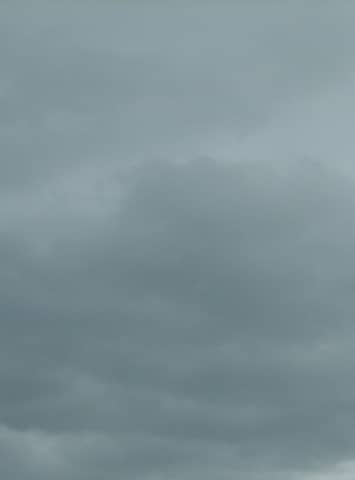
The gray sky hung low and motionless over the stony moors. The first snowflake of the year seemed to bring with it a soft silence, a stop to time itself.
Crio, feeling old, watched the tiny white speck fall. It drifted through the late autumn air, dipping, turning, ever in search of a path of least resistance. His eyes followed, caught in the dream until it ended abruptly against the cold black bark of a protruding daggermoss twig. There the snowflake clung to life and form for an instant, and then was gone.
Already, more of the skyborn ice particles were spiraling down to a similar fate, each freezing a new spot of earth or branch, throwing themselves as if in communal sacrifice so that other snowflakes might find purchase on their sisters' corpses and remain unthawed.
"Hesha, three riders have been spotted crossing the Salt. They have the look of Lowlanders," said the man named Belar, addressing Crio by the traditional title of respect, as did all those loyal to him and many who were not.
Crio nodded, his gaze lingering on the new snow. "Let them come."
Belar bowed from his saddle and trotted off to tell the sentries not to kill the riders.
The old man stood, his knotty forearm muscles bunching as he gripped the shaft of the ancient dorzhak with fingers that were hard and unyielding like the alloy from which the kingweapon had been forged. Dalba, daughter of Crio's surviving son Torvin yet already ten times the man her father had ever been, moved quickly to fetch her grandfather's horse.
Crio took the proffered reins and handed her the dorzhak to hold for him. After mounting, he leaned down to whisper into to the sixteen-year-old's ear. "Stay close. I need you ready for anything."
"I understand, Hesha," Dalba breathed.
He straightened and stared deep into the young hunter's eyes, recognizing a spark not unlike one from his younger days. She stared right back into his, confident and steady. From anyone else, the word "Hesha" was but a formality, a habit; sometimes even a stomach-turning adulation. But coming from this fierce young woman for the first time ever, from this clear-eyed granddaughter of his, those two syllables were packed with meaning: You can count on me. I am your blood; I am your zezla. To the death.
She passed him the weapon and mounted her own horse, and together they rode across snow-powdered rocks to greet the new era.
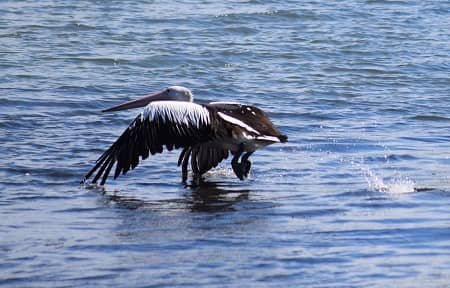
After my brother graduated from college, he headed out west to San Francisco for a while (a year or so?), and then lived on the other side of the Bay for a couple more years. My parents and I visited him while he was still in the city, and I later spent most of a summer ('95) out there with him.
It was a magical summer for me, full of emotional growth. I worked briefly for an Argentinian landscaper, played music on the streets of Berkeley and SF, slept in a shed under the emerald green boughs of a big old fig tree, and got to know my sibling from a perspective impossible in childhood. We were men now—young men, sure, but men—each trying to find his place in this world, each feeling a bit lost (and way more than a bit, at times), each full of wonder and curiosity and adventurousness. And grace, too, which is a word I don't use much due to the religious connotations it tends to have. But yes, grace. Not to say we were perfect, of course; we both had some serious issues, and those butted heads against each other more than a few times that summer. We were also at very, very different stages of life, each dealing with various challenges; at times, right as one of us was poking his head out of his shell, the other would be sticking his head in the sand, or vice versa. But those few months were a time I’ll never forget, full of memories I’ll forever cherish.
One was of day in perhaps late July, when my brother and I drove down to Point Lobos. We hiked all day along the cliffs and enjoyed the sights, including a late morning view of a little cove in which a couple of very cute sea otters rode the gentle kelp-strewn waves on their backs while cracking abalones against flat rocks they had balanced on their tummies.
At the end of our day hike, we plonked ourselves down in the sand of a little secluded beach not far from the car and fired up the camp stove for a meal of ramen noodles and Sierra Nevada pale ale. By then the wind and waves had stopped; the ocean surface was practically glass. Circling over the bay right in front of us were several brown pelicans that dove repeatedly for fish in the blood orange glow of the setting sun.
I read somewhere that most pelicans of that species end up dying from starvation; after a lifetime of plummeting straight down and smacking the water with their faces, they go blind and eventually can’t feed themselves anymore. I have seen eagles dive, too, and hit the water like a truck, though they more often skim down at a shallower angle to nab the fish with their talons, seemingly barely breaking the surface in their grace. But sometimes even a glorious eagle will plummet, too, and go almost completely underwater. I’ve seen it happen.
We soar and soar and soar, wherever we go, wherever our minds and hearts take us. Occasionally we might crash out, completely missing what we were aiming for, or even temporarily lose our sight. It can take a while to pick ourselves back up.
But we do. We don’t starve. Because even after blindness, there is vision to be found; and even over the distance of thousands of miles and dozens of years, that sense of wonder and camaraderie and adventure returns. It happens; it has before, and it will again.

It keeps... happening. I think I'm still me. But now I'm more of me.
I remember Jasper touching the bubble thing and how it grew. I yelled at her What are you doing but she ignored me and suddenly it had her hand inside it like it was sucking her in. I screamed again but she didn't make a sound she just stood there and then she was gone. I swear I didn't know whether to jump in after her or try to get away. I wanted to jump but I was too scared.
Then the bubble thing bulged and that set the hairs on my neck on end so I backed up against the concave wall and tried not to move. There was nowhere else to go. How did they put us in a room without a door. It makes no sense.
When there was nowhere left to go and the bubble had bulged up to my foot I knew I was done for so I just kicked and kicked and wished I had a metal pipe or a burning stick. Anything. Then it had my legs and then I felt it rising past my hips and I must have blacked out.
I'm... simpler now. It's like I have a body, only I don't, because it keeps... dividing. I keep dividing. But I'm still me, only there are more of me now.
I still haven't found her. But if she's dividing, too, then maybe eventually one of me will find one of her and then I can tell her. How I really wanted to jump in I just couldn't. But that I wish so much I had.
I remember when I lived in northern Ohio, which is rural and flat as a board, you could stand in the road at night and watch a car pass, and then smoke a cigarette... and several minutes later when you were done with that cigarette, you could look down that same road, and you would still see those same red taillights of the car that passed, tiny now in the distance. That's how flat and straight some of those roads are up there. Most of my memories are of snow or gray and cloudy days and nights. Sleety, icy, yellow streetlight nights.
A friend helped me do a project for "winter term" one year, an extra credit that could be added as long as you had a professor sign off on it. I got the go-ahead from my ethnomusicology professor to go down to New Orleans and play music on the street for a few days. Well, we needed a place to stay, so I obtained a print-out of a list of alumni living in the area, and began to call them, working my way down the list.
The first eight numbers I called were dead ends… several of them quite literally; they had either died or were dying. A few others had moved to whereabouts unknown. It was starting to feel eerie.
The first person to answer the phone who was actually a person on the alumni list was a friendly guy named Shawn (name made up to protect his privacy). As soon as I told him I was calling from northern Ohio, he interrupted me, saying, “Wait, okay now, let me guess: Right now it’s cold and gray and either raining or snowing outside.” I looked out the window, and sure enough, it was a mixture of rain and sleet.
We had a great time staying with Shawn and his wife Jenny (another made-up name), and I’ll forever be grateful for their generosity and hospitality and for being exposed to their uniquely cheerful perspective on the world. They showed us around and gave us our first ever New Orleans New Years experience (which deserves a blog post all to itself!). I’ll never forget it.
The roads around here are not so flat. Sure, there are beautiful mountains and trees and all that entails, but there’s something very quiet, something utterly lonely and profoundly awesome, about the flatness of northern Ohio. You can see for miles and miles. Powerlines and roads and property divisions draw into each other like an artist’s exercise in perspective.
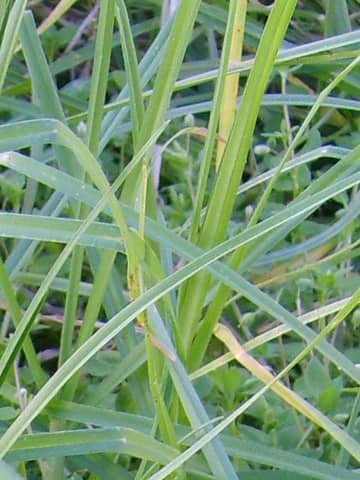
Don't be stupid," the old woman told me. "The forest can kill you. Go around." And I should have listened. But time was short, and in my heart I knew I would be fine. So straight through it I ran: underneath the barrier trees, over the mossy morel banks, into dense thorn thickets and out the other side
Not twenty minutes later I was smiling, for I had already glimpsed the light from the fields shining golden between a last line of tree trunks ahead. And then it happened: My hand brushed past a reaching bramble, and one of its tendrils snagged at my fingers.
Ever since, something has been... in me. Something growing. I can actually hear it.
At first there was only a slight itch, under the skin between my knuckles. Scratching did nothing; on the contrary, my efforts seemed to aggravate it further, for within moments the itch had traveled to the base of my wrist and become quite maddening. I quickened my pace but immediately regretted it; the faster my pulse throbbed, the more... excitement I felt emanating from the trespasser.
I broke out of the forest and the sun's rays warmed my sweating scalp. A bitter taste had fouled my tongue and y ears were buzzing. The thing inside me was growing faster now; I could feel it charging through cartilage, winding around bone, pushing aside tendons and penetrating muscle tissues, relentlessly seeking a pathway of least resistance. Then a sharp ache deep in my shoulder brought me crumpling to the ground, and I knew it had found an artery.
I lie here at the edge of this field, my vision too darkened to see the sunlight anymore. I can feel the intruder still branching, still spreading through me, still taking over. The buzzing noise is deafening now. My chest is tight, but I can't cough -- I can't even throw up; the thing will not let me. I can feel its tendrils sliding into position, sending out hundreds of tiny roots to dig deep into the flesh of my heart like so many planted flags, readying for a final squeeze.
I am green. I am conquered. I am gone.

This is my nineteenth attempt. The lag is making it even harder. But I've got this: If I can just get luck and skill to both line up at the same time, the fucker's gonna blow. I'm sure of it.
The last Overlap happened more than a decade ago, back when I was twelve. After talking it over with their families, my dad and uncle knew exactly what they had to do. So they gamed the system and got posted to rig duty. I like to think their brave sacrifice is a major reason the rest of us are still here.
Now it's our turn: mine, my little sister Deb's, almost everyone we know.
Earlier in the night, in typical Deb fashion, the dumbass went charging in the instant we linked up to the Main. She didn't even wait for the rest of the team to gather. I gotta admit, it was actually pretty hilarious; she blasted a tunnel right through the first two layers all by herself, hollering the whole way down. The others were stunned speechless for a minute, but that little performance of hers ended up doing wonders for everybody's morale.
I mean, this was some scary fuckin shit we were about to face, and boom there goes my little sister, rushing in, one hundred per cent fearless. We big muscly types had no choice but to man up after that! I mean, right?! Pfft. We were idiots. Hindsight 20-20 and all that though.
It was good though. Fear has no place down here.
Anywho, Deb kept on going, and while we were trying to catch up one of the layers reclosed behind her and cut us off. Now she's out of communications range, and I'm trying to blast through as fast as I can to get to her. But the Intelligence--our name for the invaders that engineered the Overlap--they seem to be on to us; they keep reinforcing the layer, making it harder and harder to find the right resonant frequency.
Carl Griegsohn gave the order to backtrack and hit it from another angle, in a spot half a click east of here. I ignored him and he shouted at me. So I told him Fuck off, it's my sister down there. He sputtered and threatened to disconnect me from the Main. I knew he wouldn't so I just kept working. A few seconds later he was racing back up tunnel, collecting stragglers, all snarls and bellows fading in the distance.
I'm almost there; this thing's gonna blow, I know it. Maybe Carl's proposed flank attack will be enough to distract the Intelligence from my mosquito efforts. Maybe attempt number twenty will be the magic number. Maybe Deb's on the other side, trying to work her way back through to my position.
Not bloody likely. My sister's probably already inside the Core by now, either dead or somehow still alive and about to place her charges right in the middle of the goddamned thing's brain.
Either way, I've got to blast my way through. I've got to find her. I've just got to.

The first slabs to go were usually the most spectacular, so nesters from all five valleys tended to get there early to claim the best of the available viewing perches. The unavailable ones, of course, had already been reserved; their haughty occupants would fly in at their leisure, arriving just in time for the midday games to begin and often later than that
Spotting an empty stretch of branch between a nester family and a pair of hunters, Sye'sral tucked her wings and dove. Just as she broke momentum and her talons came in contact with the deeply scarred wood, a third hunter swooped up from below, roaring territorially right in front of her. Talons scrabbling for purchase and wings flapping violently, they glared at each other for several heartbeats.
"Buzz off," one of the other hunters hissed.
The newcomer's nostrils flared, inhaling Sye'sral's scent. Suddenly the snarl froze on his face. Sye'sral narrowed her eyes at him and turned to go.
"Wait!" he mewed, moving aside while batting at her with his paw in a gesture of sundued apology.
"Oh, you smell that I'm 'in season' and suddenly there's room on the branch for both of us, is that it?" Sye'sral smirked and let go of the branch. Typical, she thought, as she dropped in a wide arc and glided over to the other side of the Greatree.
She landed on a mostly empty branch this time and made herself comfortable, preening while craning her neck to glance at the gaming sphere. The view here was quite terrible, but at least no horny males were trying to shove her off the branch.
A nearby cub yowled at his sister and copped a gruff paw on the nose from their mum. Sye'sral smiled, settled on her haunches, and reveled in the warmth from the sun. It was a beautiful day for it, if she closed her eyes and pretended she wasn't actually here to kill someone.
The trouble was that any time she left her eyes shut for any length of time these days, that annoying pull would come back, as if emboldened by the darkness. It had been getting stronger over the past month or so; it would sometimes even manifest in her dreams. There it was like a vague rope or vine, always dragging at her from the same direction:
South, it seemed to command, in a whisper formed from neither lips nor words.
Sometimes you need breaks even from the things you love most, from the things that define you. It’s baffling. But it happens. And it doesn’t mean there’s anything wrong with you.
For most of my life, up until a couple of years ago, I read every night in bed, pretty much without fail. If I didn’t read one night, it was because I was extremely tired or drunk or (when I was much younger) stoned, but even then, out of habit, I’d usually open up whatever book I was reading and get through at least a page or a paragraph or even just a sentence or two before conking out.
This continued until about two and a half years ago, when I suddenly just stopped. I still can’t tell you exactly why, because I myself don’t completely know, but it happened; I completely stopped reading novels in bed, and started playing ipad games or browsing online news instead. It wasn’t the games or the news that made me stop, to be honest. I had just stopped, and then I allowed those things to fill the vacuum. Eventually my wife started commenting on it, and I would acknowledge that I should be reading a book instead of staring at my ipad, but my head just couldn’t get into any book. I did resume reading in fits and starts, but nowhere near as much as I had been before. I think I probably read, oh, maybe a novel every six or nine months for those two and a half years. I’m naturally a slow reader, but that was extreme even for me!
And now, suddenly, beginning just month or so ago, I’m reading again.
I don’t know why. I suppose I could try to psychoanalyze myself and go into some very personal and autobiographical stuff here as to what happened, but the short of it, I think, is that trauma and ptsd played a big part in the why of my long hiatus from reading, and it seems that perhaps now, through processing grief, my fairly recent realization of just how short life is has gradually brought books and stories, and the desire to make them part of me, back into my consciousness, until I’ve suddenly felt a need to read again. In short, I think maybe I was paralyzed for a while, but now I’ve woken up. If that makes sense. And so, I want to spend what time I have left focusing on the people and things that are important to me. And reading books is one of them.
Anyway. I’m saying all this is because perhaps something inside you occasionally might need a break from reading, or whatever it is you’re in the habit of doing and which you wish you were still doing, and that’s why you are spending so much time watching youtube, scrolling through facebook or instagram or tiktok or whatever, playing games, watching tv, doing busywork, reading the news more than you really need to, staring at your navel, etc etc. It happens. Everyone needs downtime. Everyone needs breaks for various reasons.
So don’t beat yourself up if you happen to have stopped doing something you love for a while. It doesn’t mean your brain is rejecting reading or books or whatever else it is that you consider, for you personally, to be healthy and constructive; whatever those things are, they are clearly things you love deeply and always will. It simply means your brain and heart need time to reset and/or sort something out, perhaps on a deep, subconscious level. You just need time to let your subconscious mind unravel the knots. There is nothing wrong with you. I promise.
I tell you what though, I am very happy to be reading regularly again. It soothes the soul… and that reminds me of some advice a man I greatly admire once gave me: “Take a deep breath and read. It’ll calm you.”
There was this fire tower when I was growing up in Nashville. My friend and I came across it while out driving around one day; I think we had just started our senior year. This was long before 9/11 inspired strict enforcement of laws regarding climbing on public equipment.
From the top, you could see for miles in every direction; off in the distance were the skyscrapers of downtown, the hills forming the vast basin on all sides, even the ridges around Radnor. We went there that first time on a weekend, a Saturday I think, and we were so awed that we immediately decided to go there first thing Monday morning to watch the sun rise before school.
Monday morning came, and my friend met me at the bottom of my driveway (so as not to wake anyone). It was still dark and the stars were out. He was driving his mom's big brown Oldsmobile, and had brought coffee. I can’t remember if it was in plastic insulated mugs from home or takeaway cups from a convenience store.
Anyway, we drove to the fire tower and got to the top just as the sunrise was starting. It was absolutely amazing. Sailor, take warning! The morning air was cold, especially with the occasional gusts of wind. We sat there in total silence the entire time, just staring into the east, taking it all in. The horizon erupted like a slow-motion volcano.
Reluctantly, without having said more than a word or two to each other the entire time, we gave the view a mental goodbye, and made our way down West End toward school.
This early-morning trip became a ritual for us; we did it every Monday for what in my memory was a good chunk of that school year, or at least until life got in the way. I took a girlfriend up there once or twice, and those times were beautiful and special, too. In my heart of hearts, though, the fire tower will always belong to the connection between me and that friend. The ability to sit with someone in quiet awe, without feeling a need to fill the silence with words… priceless. Rare. Wonderful. Thank you, my friend.
Sadly, access is no longer possible to the tower, last I saw. But it's still a pretty drive and brings good memories.

A few weeks ago, while I was up at the open mic, someone asked me what I was like in high school, what sort of stuff I was into, etc. It took me a minute to respond. It’s not that I don’t remember; as with most people, I bet, some of my most vivid memories are from when I was a teenager, especially starting around the age of fifteen. It’s an age that concretes your sense of individuality, to say the least. But I hadn’t thought about it in a while, so it took me a moment to answer.
What was I like in high school? Hmmm. Well, I think I was a more positive, confident person back then, especially starting sometime in the 10th grade. I was lucky, though, to go to a really great school. It was a public school, but its focus was on academics (rather than football or something like that), and you had to have a B average to even get in, so most of the kids tended to spend at least a some of their time head-in-book, even if it was just to cram for some test or other. There also weren’t really any of what you might call bullies and hoodlums. Not while I was there, anyway. Part of the reason for this was the school’s relatively small size; when I graduated, there were only about 400 students across all 4 grades (9-12), and my graduating class only had 88 members I believe. The majority of the teachers loved their jobs and had a passion for teaching, so it was an inspiring place that allowed us to blossom. There were of course plenty of teenage challenges to overcome.
What was I into? I had a tight-knit group of friends from about year 10 on. Prior to that, I had a couple of close friends from the neighborhood, and plenty of school acquaintances, but it was in high school that my social life exploded, same as with most people. We did everything together, especially after we one by one got our drivers licenses. I didn't own a car, but my parents had two, so were able to let me use one of them on occasion. My friends and I were into camping, music, swordfighting, Renaissance festivals, creative writing, dinners at each other's houses, taking long drives in the countryside, getting up to no good in terms of substances and shenanigans and whatnot. But we weren't really into alcohol at all (though my brother and a neighbourhood friend and I were, especially when I was 13-15, though we never were idiots about it… well, maybe a little hehe), and we tended to maintain a modicum of common sense in general. We were nice kids, empathetic, mutually supportive. I was, however, told years later by a classmate that we were “pretty cliquey”. That took me aback. Perspective is strange though.
What was I like in high school? I was terrible at math and science (because of being terrible at math). I did well in English, despite the weird topics I tended to freewrite about. I guess my essay-writing skills made up for those.
I remember this one time, some friends and I were hanging out in some place, um... I think it was this place that used to exist called Derryl's. Or maybe it was the Loveless Cafe. Not sure. Anyways, my buddy Shawn gets this bright idea to tip out all the black pepper into a pile on the table in front of him (we were still waiting for our food; only had our drinks at that point). Then someone says something not actually very funny, but which Shawn thought was hilarious, and he guffaws and makes all that pepper go POOF all over the table and into our eyes, noses... mouths.... Fun times. It's a miracle we didn't get kicked out. That time, anyway.
What was I like in high school? I was a grumpy shit half the time, especially at home. I don’t know how my parents and brother put up with me. I was selfish, self-centered, self-conscious, and a bunch of other self- things. I meant well though, most of the time, and tried to be nice to people. I loved nature and the out-of-doors; I’m grateful that that is something that has stayed a part of me, ever since early childhood.
I was into creative writing, and even tried my hand at poetry (inspired by my big brother, no doubt). Here’s one I wrote:
When Coyotes Hunt
by Gaines Post
...And here’s another, written in 10th or 11th grade:
The Man Who Is Part of Me
by Gaines Post
So, hmmm. What was I like in high school? I am still not really sure how to answer that question. I guess I was a daydreamer. There are parts of who I was back then that have faded or are hidden from me. I wish I could get them back. Perhaps I can. Perhaps we all can.
I was not supposed to be here; Markam was strictly off limits to “foreigners”. And yet here I was, after a several days of walking and hitchhiking on precarious mountain roads that wound over steep mountain passes and along deep, cliff-strewn ravines.
It was not a very large town, but it was not a mere village, either; there was a central paved boulevard lined with buildings that were in places as many as five stories high, and even a few restaurants, though not at all of the sort I’d seen in the country of my birth. The truck I’d caught a ride on, having brought up a huge haul of fresh cabbages and pumpkins from farmlands in the valleys of northwestern Yunnan, was ending its run in Markam. We pulled in at just after nightfall, and there were streetlights painting the main drag yellow—the first streetlights I’d seen in over a week.
The other “hitchhikers” were locals coming home to the region from work or business trips; the long-distance busses in this part of eastern Tibet were too infrequent and expensive for that to be a reliable form of public transportation, so most people paid haulers like our truck driver, either with barter or money, to get from town to town. In my case, I had nothing to trade and no skills deemed valuable up here, so I paid cash. It was still dirt cheap, from my perspective.
My comrades of the last couple days’ ride said their goodbyes, mostly in Khams Tibetan but one or two of them in the Lhasa dialect; only one of them spoke Chinese—the driver—and he spoke it only to me, since I spoke virtually no Tibetan at all. He also was the only one wearing the typical Chinese-style army green duds you see in the countryside all over the place, “the uniform of the people” or “peasant clothing” it’s sometimes called, and which is often dark blue instead of olive drab, though he was also Kham and had mentioned he'd grown up in the area. He was kind enough to point out the local zhaodaisuo for me, which are a bit like a travelers’ motels. Sort of. Anyway, I needed my student I.D. to stay in one, which I had (that was back before I’d lost it). I thanked him and said farewell in Tibetan (the Lhasa dialect, I later learned), shrugged my heavy bag onto my shoulder, and made my way up the street to the sign he’d pointed out.
The elderly married couple running the zhaodaisuo looked very nervous and more than a little alarmed when I walked in the door. With good reason: Never mind that fact that I was likely the first foreigner they’d seen in Markam in years, or perhaps ever; most importantly, this region was off limits to foreigners back then, as I mentioned, so I was breaking the law by even being there. They were therefore very reluctant to let me check in, as they would be breaking law, too.
They told me to wait in the foyer, such as it was, while they went back into an office of sorts and conversed in low tones in a regional Chinese dialect. I only caught a few words.
At length the husband came out to address me; his Putonghua, or Mandarin, was more fluent than his wife’s. Speaking very slowly so that I could understand, he told me normally they would say “no”, given that it was illegal to house foreigners, but that it was going to be a cold night and there were no hotels in Markam, so they would allow me to stay one night—provided I left before sun-up. My Chinese was not very good, but after repeating some of those points a few times, I got the gist of what he was saying. He also said he would have to keep my passport and give it back to me in the early morning when I left, for security reasons. This was normal, so I handed it over, thanking them both profusely for allowing me to stay. It occurred to me that I really would have been screwed if they’d said “no” (I had not exactly planned this journey ahead very well). The wife smiled and led me up to my room. It was a very small one, out of the way, at the very end of the hallway up on the fifth floor. There was a clean single bed and a desk with a small chair next to the barred window that looked down onto the back courtyard. After I’d gotten settled, she brought me a large thermos full of hot water for tea (all zhaodaisuo rooms have green tea leaves provided, as well as a mug and a thermos of hot water like this).
I found an eatery a block or so away that let you choose which vegetables you wanted in your dishes; I had youcai (canola greens and flower buds I think?) with rice, and another dish of scrambled eggs with chunks of fresh tomato. It was delicious, and familiar; I’d had fare like this in Yunnan a lot.
That night I fell asleep to the faint sound of drunken karaoke singing, somewhere down the street. It did indeed get cold, and I covered my head with the faux-silk-covered comforter. When the proprietor came up to very apologetically wake me up at around 4:30 in the morning, the stars were out and there wasn't even a hint of sunrise on the horizon yet.
He handed me back my passport, wished me a good journey in Chinese, and I said thank you and set out. There was no one else on the street as I hurried along the main drag, and soon I’d left the streetlights behind and was out on the vast plain, high above tree level (which I had been for days). The sky was jaw-dropping; I could see the stars and dust of the Milky Way so clearly there were colors. The dirt road was covered in patches of ice where the water had drained across it during the day, and my feet crunched loudly as I walked. A little ways out of town, I was beset upon by a pack of dogs.
But that’s a story for another time.
All content © 2024 Otherspect. Plagiarists and thieves will be hunted down and destroyed. Also, I get a tiny commission through links to works for sale at Amazon.com via that company's Associates program. It's miniscule (literally a matter of a few extra cents, not dollars), but I am required to disclose it.